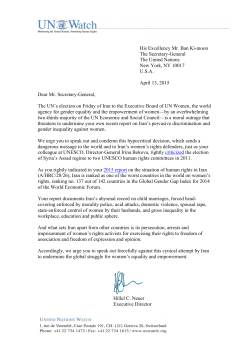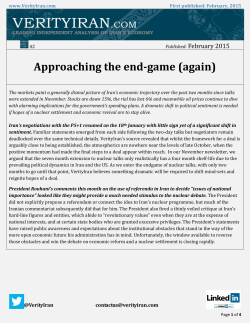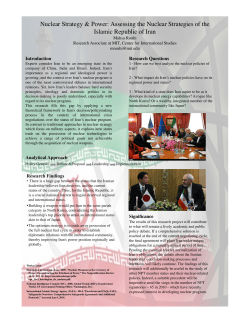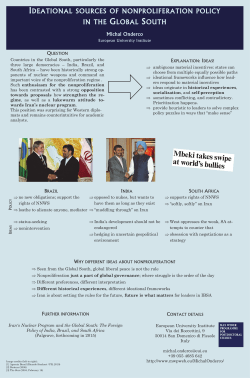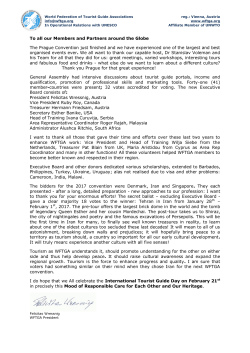
Pdf Version
Central Asia States to Use Iran Transit Route Report: Talks May Be Extended TEHRAN (Press TV) -- An official of the Islamic Republic of Iran Railways said Saturday countries in Central Asia are mulling a plan to use Iran’s railroad network as transit route for bulk cargoes. Hussein Ashouri, deputy head of the Islamic Republic of Iran Railways, said the Central Asian countries have plans to carry various kinds of bulk and container cargoes from the Inchehboroun border crossing in Iran’s northern Golestan Province to southern Iranian port city of Bandar Abbas. VIENNA (Dispatches) -- Nuclear talks between the six world powers and Iran may be extended past the June 30 target date for a finalized accord. According to two Western sources including a senior U.S. official, the negotiations were at a “delicate” stage and may have to go beyond the self-imposed deadline, CNN reported. The sources also downplayed a report in the Russian press indicating that the negotiations reached a critical slowdown. A report in the news agency Tass quoted a Russian official as saying the talks were “virtually stalled.” VOL NO: LV 9780 TEHRAN / Est.1959 2 Viewpoint By: Kayhan Int’l Staff Writer Justice Tossed Aside in Gaza 3 The Fars news agency said the Iranian Foreign Ministry had written to the Austrian and Swiss governments expressing “serious concern”. “Tehran has also asked to be informed about the results of investigations over the issue,” it said. “Iran wants all necessary measures ... taken to secure the talks, including cyber security, as soon as possible,” Fars cited the ministry’s letter to Austria as saying. Swiss and Austrian authorities said on Thursday they had opened separate investigations into alleged spying in hotels where the nuclear talks with Iran are taking place. Information Technology (IT) experts pointed the finger at occupying regime of Israel. In a statement, Iran’s embassy in Austria, “demanded Austria’s foreign ministry immediately provide all required security measures for the talks, including enhanced security for the venues as well as better cyber protection”, the ISNA news agency reported. Iranian embassies in Vienna and Bern, in separate notes, also asked the Austrian and Swiss foreign ministries to inform them of “the results of spying investigations” by both governments on nuclear talks. A Russian-based security firm said on Wednesday that the malware dubbed Duqu, a sophisticated spy tool believed to have been eradicated in 2012, appeared to have been used to spy on the nuclear negotiations. Russian computer security company Kaspersky Lab said that a computer virus was used to hack into sites including three luxury hotels that have hosted the nuclear negotiations in Austria and Switzerland. Both Kaspersky and U.S. security company Symantec said the virus shared some programming with previously discovered espionage software called Duqu, which security experts believe to have been developed by the Zionists. The investigations come as the clock ticks down to a June 30 deadline for an accord between Iran and world powers. On Saturday, a top Iranian military commander advised the Iranian nuclear negotiators involved in talks with the P5+1 countries to be watchful of potential attempts to spy on the talks. 6 Iran Opens First Herb Museum Negotiators Warned to Watch for Spies TEHRAN (Dispatches) -- Iran has asked Austria’s government to take immediate measures to protect the cyber security of nuclear talks after reports emerged of suspected espionage at negotiation venues. Sunday, June 14, 2015, Khordad 24, 1394, Sha’ban 26, 1436, Price 10000 Rials Head of Iran’s Passive Defense Organization Brigadier General Gholamreza Jalali said it is against diplomatic norms to grant access to the venues of negotiations to enemies for spying purposes. He advised Iranian officials involved in the negotiations at foreign venues not to use smartphones when trying to communicate classified information because of the high risks associated with the devices. Such phones are not secure as “data entered on to them is backed up, cannot be removed and can be accessed”, Jalali told ISNA news agency, alluding to smartphone applications and manufacturers. He said a new rule, which is pending final approval, would mean officials “should use other phones for work that involves sensitive information”. There is nothing to stop such workers using smartphones in their private lives, he said. Negotiators from Iran and the P5+1 countries have held talks at Swiss hotels of Beau-Rivage Palace, Royal Plaza Montreux, Intercontinental and Hotel President Wilson as well as Palais Coburg in Vienna. The two sides are working to reach a comprehensive nuclear accord by the end of June. Elsewhere in his remarks, Jalali said 23 countries have currently set up defense and offense mechanisms on cyberspace. He then pointed to the 2010-11 Stuxnet virus cyber attacks on Iran’s nuclear energy facilities, saying that Iran is set to open a cyber defense center in less than a month to defend itself against such attacks. The Washington Post reported in June 2012 that the U.S. National Security Agency (NSA), the Central Intelligence Agency (CIA) and the occupying regime of Israel’s military had colluded with each other to launch the virus attack in an attempt to cripple Iran’s peaceful nuclear energy program. Iran Stands Third at Beach Wrestling World Championship 8 “Yemenis Need Urgent Humanitarian Aid” President Rouhani: Iran Not in a Hurry in Nuclear Talks President Rouhani talks to reporters on the anniversary of his election victory. TEHRAN (Dispatches) -- There are still “many differences over details” of a nuclear deal Iran and world powers are trying to conclude by June 30, Iranian President Hassan Rouhani said Saturday. Iranian negotiators and those of the P5+1 group are meeting in Vienna to clinch a deal that would guarantee the strictly peaceful nature of Tehran’s nuclear program in exchange for a lifting of U.S.-led sanctions. “The general framework that the Islamic Republic of Iran wants is accepted by the P5+1 group but there are still many differences in the details that must be addressed,” Rouhani told a press conference on the occasion of the second anniversary of his election. “We are very serious in the negotiations. We do not seek to gain time, but at the same time we are not captives of time. We are not in a hurry but we try to use every opportunity to reach a good deal,” he added. On Friday, a senior Russian official said there had been a “very worrying” slowdown in progress in the talks. “This is very worrying to us because there is very little time before the deadline and we urgently need to enter the final stage,” said chief Moscow negotiator Sergei Ryabkov. Rouhani criticized Western countries which he said “haggle” permanently on the terms of the nuclear deal. “In a meeting we come to a framework agreement with the other party but the next time they start to haggle, causing delays in the negotiation,” said Rouhani. “If the other party respects the agreed framework and does not add other demands, the differences can be resolved, but if they choose the path of haggling then it can prolong the negotiations,” he added. The Iranian president also said that “several months will pass” between the signing of the agreement until its implementation. “We are currently discussing it,” (Continued on Page 7) Shana: Iran Seeks Resurrecting OPEC Quota TEHRAN (Dispatches) -- Iran sought to bring back OPEC export quotas at the group’s meeting in Vienna last week, the oil news agency Shana reported. Iran’s OPEC governor Hussein Kazempour Ardabili sent a letter to the group’s secretariat last week proposing “a technical price formula that can resurrect the quota system and also prevent prices from falling”, Shana reported on Saturday. Minister of Petroleum Bijan Zangeneh also wrote to the Organization of the Petroleum Exporting Countries ahead of its June 5 meeting, insisting on Iran’s right to return to the market if oil sanc- tions, imposed in 2012 because of the country’s nuclear program, are lifted. OPEC decided to stick to its policy of unconstrained output for another six months, with oil prices having rebounded to around $65 a barrel after hitting a six-year low of $45 a barrel in January. The group’s current output levels are much higher than the its official output ceiling of 30 million barrels per day. Iran’s proposal for a revival of export quotas would allow it to return to the market in force. But this has faced resistance from other OPEC members who would have to cut their own output under a quota system to accommodate Iran’s return. In his letter, Zangeneh said Iran could add 1 million barrels per day (bpd) to its production within six to seven months of sanctions being lifted. This could occur if the Islamic Republic reaches a deal with world powers on its nuclear program. On Saturday, Zangeneh was quoted as saying that he had told Iranian negotiators to press the Americans on removing ban on business by U.S. companies in Iran. Negotiations between Iranian and American teams are limited to Tehran’s nuclear program but at the heart of the talks are U.S.-led sanctions which prevent international companies from trade with Iran. Zangeneh said it is “both good and necessary” to include lifting the ban on American companies in the ongoing talks with US negotiators in order to raise Iran’s bargaining leverage in trade negotiations with international companies. “We must not allow the U.S. government’s restrictions to continue because the more competition, the better we can get high quality services and increase our bargaining power. There’s no reason not to do that,” he said. (Continued on Page 7) CIA Releases Declassified 9/11 Documents WASHINGTON (Dispatches) -- The CIA has released declassified versions of five internal documents dealing with the 9/11 terror attacks, according to a press release sent to reporters. The documents are described as being “related to the agency’s performance in the lead-up to the attacks”. The release comes just before the weekend, a time when many organizations tend to “dump” news in an attempt to minimize coverage. VICE News is currently reviewing the documents in detail. The CIA describes them as including “a redacted version of the 2005 CIA Office of Inspector General (OIG) Report on Central Intelligence Agency Accountability Regarding Findings and Conclusions of the Report of the Joint Inquiry into Intelligence Community Activities Before and After the Terrorist Attacks of September 11, 2001”. The executive summary of the OIG report was released in 2007, and the CIA says it released the full report in response to Freedom of Information Act requests. The 500-page document reportedly underwent “an extensive review… in order to release information that no longer needed to be protected in the interests of national security”. Other documents included in the release are two internal statements by former CIA Director George Tenet in February 2005 and June 2005 that were issued in response to drafts of the 2005 OIG report. Two other documents that were previously made public were also re-released with fewer redactions “in light of the recent declassification of information on CIA’s counterterrorism operations”. “The events of 9/11 will be for- ever seared into the memories of all Americans who bore witness to the single greatest tragedy to befall our homeland in recent history,” the CIA’s press release said. “The documents released today reflect differing views formed roughly a decade ago within CIA about the Agency’s performance prior to 9/11.” PDF versions of the documents can be found at the CIA’s online reading room.
© Copyright 2025
